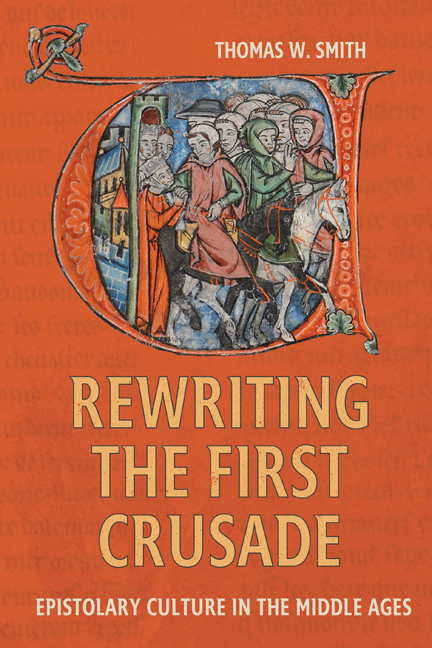Book contents
- Frontmatter
- Dedication
- Contents
- List of Illustrations
- Acknowledgements
- List of Abbreviations
- Introduction
- 1 The Call from the East: The Letters of Alexios I
- 2 The Launch of the Crusade: The Letters of Urban II, 1095–96
- 3 Letters from the Crusader Host, 1097–98
- 4 Letters from the Leaders of the Crusade, 1097–98
- 5 Interpreting the News from the East, 1099–1100
- 6 First Crusade Letters and Medieval Manuscript Cultures
- Conclusion
- Appendix: New Manuscripts of First Crusade Letters
- Bibliography
- Manuscript Index
- General Index
- Crusading in Context
3 - Letters from the Crusader Host, 1097–98
Published online by Cambridge University Press: 09 May 2024
- Frontmatter
- Dedication
- Contents
- List of Illustrations
- Acknowledgements
- List of Abbreviations
- Introduction
- 1 The Call from the East: The Letters of Alexios I
- 2 The Launch of the Crusade: The Letters of Urban II, 1095–96
- 3 Letters from the Crusader Host, 1097–98
- 4 Letters from the Leaders of the Crusade, 1097–98
- 5 Interpreting the News from the East, 1099–1100
- 6 First Crusade Letters and Medieval Manuscript Cultures
- Conclusion
- Appendix: New Manuscripts of First Crusade Letters
- Bibliography
- Manuscript Index
- General Index
- Crusading in Context
Summary
There are two discrete groups of campaign letters from the First Crusade. One is the cluster of four letters, explored in the following chapter, that purport to have been written by leaders of the crusade before the capture of Jerusalem, addressed as open letters to the West or the pope. These ‘collective projects’, Nicholas Paul writes, are distinct from ‘the letters composed by named individual authors to named individual recipients’, that is, the missives of figures such as Stephen of Blois and Anselm of Ribemont. The present chapter examines these narrative letters sent from within the crusader host. We are fortunate to possess five such epistles, including two letters by Stephen of Blois, another two by Anselm of Ribemont, and a single letter from Lucca. These letters are not only rare because the first four appear to have been sent directly from the campaign specifically, but also as epistolary products of their time generally. They belong to the concept of ‘fast historiography’ which Lars Boje Mortensen identifies emerging in the twelfth and thirteenth centuries, in which the transmission of news from crusade campaigns played a significant role.
As Martha Carlin and David Crouch caution, we must not imagine that relatively ordinary people did not send letters in the Middle Ages; it is merely that they have not survived. As their edition of ‘lost letters’ from thirteenthcentury England reveals, we must imagine a world in which a fascinating gamut of casual and informal letters was circulating, ranging from magnates worrying about wine orders, through students writing to their parents to ask for money and masters instructing pupils to stop wasting time, to gossip about alleged adultery. By their very nature, most of these letters did not concern what contemporaries considered ‘important’ topics worthy of recording for posterity, and this, combined with the fact that parchment was expensive and could be scraped clean to create palimpsests, means that they were not actively preserved.
Though, as count of Blois and Chartres, one of the foremost nobles of Christendom, Stephen of Blois could hardly be counted as ordinary, it is no coincidence that the apparently touchingly personal letters which he purportedly sent from the First Crusade to his ‘dearest wife’ are some of the most well-known of all medieval letters.
- Type
- Chapter
- Information
- Rewriting the First CrusadeEpistolary Culture in the Middle Ages, pp. 57 - 100Publisher: Boydell & BrewerPrint publication year: 2024



